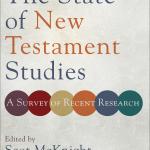My friend Dr. Holly Beers kindly answered some questions I had about her wonderful new book, A Week in the Life of a Greco-Roman Woman (IVP, 2019). Beers teaches New Testament at Westmont College.
NKG: What inspired you to write this book?
HB: I pursued the academic life because I’ve always wanted to serve the church. I mourn the divide that I often see between biblical scholarship and the church, and one of my life goals is to help bridge that divide. I think that the church needs to be more intentional about using the resources that are already available, but I think an even bigger part of the responsibility falls on Christian scholars, because we need to write books (at least sometimes) not just for other scholars but for the broader church. I’ve always wanted to write a well-researched book that my mom could read. I finally have one for her.
NKG: Biblical scholars don’t normally write fiction. Was this hard for you? How did you learn how to do it well? What was the hardest part?
YHB: Yes, it was hard, especially at first. I’ve probably read thousands of novels in my life (because I’m nerdy and that’s what I do for fun), but I’ve not written one until now. Some of my first attempts were pretty awkward, if I’m being honest. But then I decided to follow my imagination — to allow myself to see the action in my head, almost like watching a movie — and then I just wrote what I saw. The writing really picked up at that point. The hardest part was trying to decide when to include the historical and cultural information in the story itself and when it needed to be placed in a sidebar because otherwise it was distracting to the story.
NKG: I assume you did lots of research on the daily lives of women in the Roman world. What did you learn that surprised you?
HB: Yes, I did a lot of research. One of the most surprising aspects is how often most women would have been out and about in public spaces in the ancient world. They would have gone to the marketplace, the baths, the lecture halls. There’s a common perception that women would have been behind closed doors in private, confined spaces, but that would only have been an option for the very wealthy. Most women needed to participate in the daily routines of their families and communities in order to survive.
NKG: What else are you working on these days?
HB: I have another passion project in the works. I was raised in a Pentecostal context and still see that tradition as my home, and I have wanted to write for that audience. Sometimes in Pentecostal circles there are anti-intellectual sentiments, and they can be valid because Pentecostals have seen the text dissected by scholars rather than engaged as a Spirit-inspired source of life. My friend Craig Keener and I are going to co-edit a new commentary series on the New Testament that aims to serve the (broadly defined) charismatic and Pentecostal church, both in the “west” and around the world. We want to model for our own tradition what it can look like to be informed by the best of scholarship but also be sensitive to the Spirit’s work in inspiring the biblical texts, in our reading and study of the texts, and in our churches and lives today.












